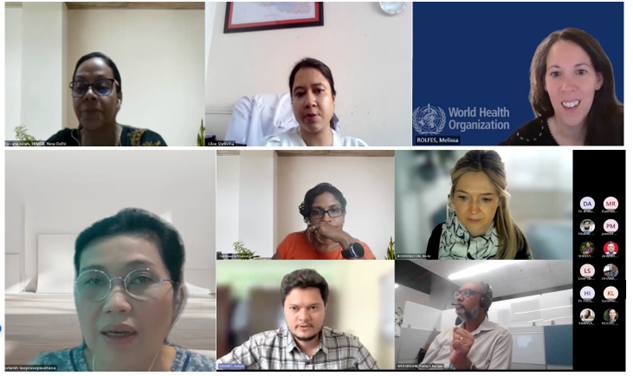The WHO Investigations and Studies global and regional initiative, branded as Unity Studies, encompasses a suite of enhanced surveillance activities designed to provide detailed insights into the epidemiological characteristics of emerging or re-emerging respiratory viruses of pandemic potential (ex. influenza viruses, coronaviruses, etc.). These studies serve as critical tools to supplement routine surveillance systems addressing specific questions, particularly during the early stages of a pandemic. They also facilitate continuous, periodic, or alert-driven assessments (e.g., in response to the emergence of a new sub-type, variant, or lineage) over time.
On 3rd July 2024, a virtual meeting was held with the focal points from the nominated institutions of selected Member States and WHO Country offices (WCOs) as the first step in establishing the Unity Studies Network in the Southeast Asia Region. The regional office recommended countries based on the unity studies conducted during the COVID-19 pandemic in WHO’s Southeast Asia region. In the selected countries, the Ministry of Health, in coordination with respective WCOs, nominated the sites for the proposed network based on shared global Terms of Reference (ToR), short videos, and other relevant resources. The objective of the meeting was to provide an overview of the concept and ToR of Unity studies and to discuss the way forward.

The meeting was facilitated by Dr. Pushpa Ranjan Wijesinghe, Programme Area Manager, IHM/WHE/SEARO. An expert consultant from WHO headquarters presented the overall concept and ToR of the unity studies. This presentation was followed by an engaging discussion with the focal points from the institutions who expressed their support for the initiative in the region.
The meeting concluded with feedback on the ToR for regional adaptation and signing by the nominated institutions. It was decided that upon finalization of ToR and communication from WHO headquarters, the regional office will reach out to the selected sites through WHO Country Offices to formalize the network in the Southeast Asia region.
Investigations and studies are recommended as a core component of the enhanced surveillance approach in the WHO Mosaic Respiratory Surveillance Framework. Similarly, the Strategic Framework for Action for Strengthening Surveillance, Risk Assessment and Field Epidemiology for Health Security Threats in the WHO South-East Asia Region prioritize strengthening field investigations and special epidemiological studies. These frameworks highlight the critical role in informing evidence-based public health action and policies, which are integral components of multisource collaborative surveillance.
The unity studies are also linked to the Pandemic influenza preparedness framework: partnership contribution high-level implementation plan III 2024-2030, which includes one KPI (“The number of sites participating in the WHO investigations and studies network”), under Output 2: Collaborative Surveillance. It is linked to the Deliverable B: “Resilient surveillance systems are improved and maintained in a One Health context. For more information on the Unity Studies initiative please, click here.
